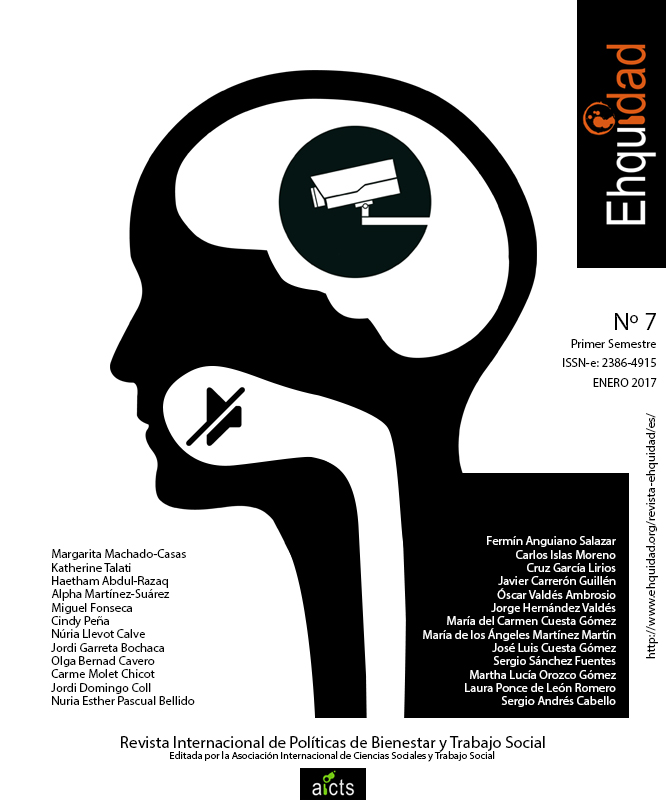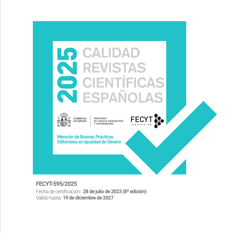Pedagogías del Títere: La marginación, hegemonía y el tratamiento colonizado de inmigrantes y familias refugiadas
DOI:
https://doi.org/10.15257/2017.0001Palabras clave:
Familias Latinas, Compromiso de los padres, Capital familiar, Familias refugiadasResumen
La pedagogía de la marioneta se basa en los fundamentos teóricos de las críticas de LatCrit a través de un discurso descolonizante en que las maneras de déficit latino y las familias de refugiados se han colocado de manera marginalizada en relación con su participación en las escuelas. Basado en métodos etnográficos, a través de la simbiosis de las relaciones de poder entre el titiritero (escuela, administradores, maestros) relacionadas con el lenguaje, la cultura y las percepciones que tienen de las familias latinas y refugiadas. Nos dedicamos a desenmascarar el discurso de la invisibilidad de la marioneta, las familias latinas y las familias de refugiados, para entender cómo las escuelas pueden resistir activamente a estas conductas hegemónicas y activamente despertar al titiritero tomando medidas para enfrentar estas injusticias. Utilizando el marco teórico de fondos de conocimiento de Moll (1992) y el capital familiar de Yosso (2005) definido como los recursos humanos sociales y personales a los que los estudiantes tienen acceso en sus medios ambientes. Extendemos el trabajo de Yosso (2005) y Abdul-Razaq (2017) proporcionando ejemplos del compromiso familiar del siglo XXI para familias latinas y refugiadas, incluyendo comenzar con las necesidades y bienes de los padres y los niños como los más beneficiosos para fomentar relaciones de colaboración respetuosas entre las escuelas y las familias.Descargas
Citas
Abdul-Razaq, H. T. (2017). Refugee Families’ Engagement with the Public School System: The Integration Journey of the Iraqi Refugees (Unpublished doctoral dissertation). University of Texas at San Antonio, San Antonio TX.
Auerbach, S. (2011). Learning from Latino families. Learning, 68 (8), 16-21.
Baird, A. S. (2015). Beyond the Greatest Hits: A Counterstory of English Learner Parent involvement. School Community Journal, 25 (2), 153.
Bell, D. (1989; 2008). And we are not saved: The elusive quest for racial justice. New York: Basic Books.
Bernal, D. D. (2002). Critical Race Theory, Latino Critical Theory, and Critical Raced-Gendered Epistemologies: Recognizing Students of Color as Holders and Creators of Knowledge. Qualitative Inquiry 8(1), 105-126.
Berry, J. W. (1997). Immigration, acculturation, and adaptation. Applied psychology, 46(1), 5-34.
Brantlinger, E. A. (2003). Dividing classes: How the middle class negotiates and rationalizes school advantage. New York, N.Y: RoutledgeFalmer.
Carman, K. L., Dardess, P., Maurer, M., Sofaer, S., Adams, K., Bechtel, C., & Sweeney, J. (2013). Patient and family engagement: a framework for understanding the elements and developing interventions and policies. Health Affairs, 32(2), 223-231.
Caspe, M., Lopez, M. E., Chu, A., & Weiss, H. B. (2011). Teaching the teachers: Preparing educators to engage families for student achievement. Cambridge, MA: Harvard Family Research Project.
Chrispeels, J., Wang, J., & Rivero, E. (2000). Evaluation Summary of the Impact of the Parent Institute for Quality Education on Parent’s Engagement with their Children’s Schooling. Santa Barbara CA: Graduate School of Education. Retrieved from www.piqe.org/oldweb/Assets/Home/ChrispeelEvaluation.htm.
Clandinin, D. J., & Huber, J. (2002). Narrative inquiry: Toward understanding Life’s artistry. Curriculum Inquiry, 32(2), 161-169. doi:10.1111/1467-873X.00220
Constantino, R. (2008). It’s not rocket science; students know what is good for them: The efficacy of a quality school library. Knowledge Quest, 36(4), 60-63. Retrieved from https://login.libweb.lib.utsa.edu/login?url=http://search.proquest.com.libweb.lib.utsa.edu/docview/194728504?accountid=7122
Crawford, P. A., & Zygouris-Coe, V. (2006). All in the family: Connecting home and school with family literacy. Early Childhood Education Journal, 33(4), 261-267. doi: 10.1007/s10643-005-0047-x
Creswell, J. W. (2003). Research Design: Qualitative, Quantitative, and Mixed Methods Approaches, 2nd ed. Thousand Oaks, CA: Sage Publications, Inc.
Christenson, S., & Sheridan, S. M. (Eds.). (2001). Schools and families: Creating essential connections for learning. New York: Guilford Press.
Darling-Hammond, L. (1997). The right to learn: a blueprint for creating schools that work. San Francisco: Jossey-Bass.
De Carvalho, M. E. (2001). Rethinking family-school relations: A critique of parental involvement in schooling. Florence: Routledge.
Delgado-Gaitan. Consejos: The power of cultural narratives. Anthropology and Education Quarterly, 25(3), 298-316.
Epstein, J. (1996). This we believe and now we must act: Improving School-Family-Community Partnerships in the Middle Grades. Middle School Journal, 28(2), 43-48. Retrieved from http://www.jstor.org.libweb.lib.utsa.edu/stable/23023304
Evans, M. P. (2011). Revisiting emotional geographies: Implications for family engagement and education policy in the United States. Journal of Educational Change 12(2), 241-255. doi: 10.1007/s10833-011-9155-0
Fine, M. (1993). [Ap] parent involvement: Reflections on parents, power, and urban public schools. New York: Teachers College Record.
Freire, P. (1993). Pedagogy for the City. New York: Continuum Press.
Fox, J. (2006). Reframing mexican migration as a multi-ethnic Process1. Latino Studies, 4(1-2), 39-61. doi: 10.1057/palgrave.lst.8600173
Gándara, P. C. (1995). Over the ivy walls: The educational mobility of low-income chicanos. Albany: State University of New York Press.
Gándara, P. (2010). The Latino Education Crisis. Educational Leadership, 67(5), 24-30.
González, N., Moll, L. C., & Amanti, C. (2005). Funds of knowledge: Theorizing practices in households, communities, and classrooms. Mahwah, N.J.: Routledge.
Green, C. L., Walker, J. M., Hoover-Dempsey, K. V., & Sandler, H. M. (2007). Parents' motivations for involvement in children's education: An empirical test of a theoretical model of parental involvement. Journal of educational psychology, 99(3), 532.
Halgunseth, L. (2009). Family engagement, diverse families, and early childhood education programs: An integrated review of the literature. YC Young Children, 64(5), 56-58.
Halgunseth, L., Peterson, A., Stark, D. R., & Moodie, S. (2009). Family engagement, diverse families, and early childhood education programs: An integrated review of the literature. Washington, DC: NAEYC and Pre-K Now.
Henderson, A. T., & Bernal, N. (1994). A new generation of evidence: The family is critical to student achievement. Washington D.C.: National Committee for Citizens in Education.
Henderson, A. T., & Mapp, K. L. (2002). A New Wave of Evidence: The Impact of School, Family, and Community Connections on Student Achievement. Annual Synthesis 2002. Austin: National Center for Family and Community Connections with Schools.
Hidalgo, N. M. (1998). Toward a definition of a Latino family research paradigm. International Journal of Qualitative Studies in Education 11(1), 103-120.
Hoover-Dempsey, K. V., Walker, J. M., Sandler, H. M., Whetsel, D., Green, C. L., Wilkins, A. S., & Closson, K. (2005). Why do parents become involved? Research findings and implications. The elementary school journal, 106(2), 105-130.
Jiménez-Castellanos, O., Ochoa, A. M., & Olivos, E. M. (2016). Operationalizing Transformative Parent Engagement in Latino School Communities: A Case Study. Journal of Latino-Latin American Studies (JOLLAS), 8(1), 93-107.
Jordan, C., Orozco, E., & Averett, A. (2002). Emerging Issues in School, Family, & Community Connections. Annual Synthesis, 2001.
Kim, Y. (2009). Minority parental involvement and school barriers: Moving the focus away from deficiencies of parents. Educational Research Review, 4(2), 80-102.
Lareau, A. (2000). Home advantage: Social class and parental intervention in elementary education. Lanham: Rowman & Littlefield.
Lopez, G. (2001). The value of hard work: Lessons on parent involvement from an (im) migrant household. Harvard Educational Review, 71(3), 416-438.
Lowenhaupt, R. (2014). School access and participation: Family engagement practices in the new Latino diaspora. Education and Urban Society, 46(5), 522-547.
Lucas, T., Villegas, A. M., & Freedson-Gonzalez, M. (2008). Linguistically responsive teacher education preparing classroom teachers to teach English language learners. Journal of Teacher Education, 59(4), 361-373.
Machado-Casas, M. & Alaniz, I. (2015). La tecnología como inclusión educativa de la diversidad cultural: Transformando practicas informales de educación en los estados unidos. Diversidad Cultural e inclusión socioeducativa Journal, 5(1), 45-60.
Machado-Casas, M., & Flores, B. B. (2015). Engaging Latino Families In Technology: Transforming and Empowering Home Pedagogy and Practices. Psychology, Knowledge and Society. Psychologia, Conocimiento y Sociedad Journal, 4(2), 89-108.
Machado-Casas, M. (2014). Supervivencia y trascendencia de inmigrantes Latinos indígenas transnacionales (ILIS) en los estados unidos. Pedagogía Social. 23(1), 12-36.
Machado-Casas, M. (2012). Pedagogía del camaleón / Pedagogies of the chamaeleon: Strategies of survival and identity for transnational indigenous Latino immigrants in the US south. The Urban Review, 44(5).
Machado-Casas, M. (2009). The politics of organic phylogeny: The art of parenting and surviving as transnational multilingual Latino indigenous immigrants in the U.S. High School Journal, 92(4), 82-99.
Mahalingam, R. (2007). Essentialism and cultural narratives: A social-marginality perspective. In A. J. Fuligni (Ed.), Contesting stereotypes and creating identities: Social categories, social identities, and educational participation (pp. 42 – 65). New York: Russell Sage.
Merriam, S. B. (1998). Qualitative research and case study applications in education (2nd ed.). San Francisco: Jossey-Bass Publishers.
Moll, L. C., Amanti, C., Neff, D., & Gonzalez, N. (1992). Funds of knowledge for teaching: Using a qualitative approach to connect homes and classrooms. Theory into practice, 31(2), 132-141.
Office of Refugee Resettlement (2017). Refugee Arrival Data. Retrieved on March 9, 2017 https://www.acf.hhs.gov/orr/resource/refugee-arrival-data
Ogbu, J. U., & Simons, H. D. (1998). Voluntary and involuntary minorities: a cultural –ecological theory of school performance with implications for education. Antropology and Education Quarterly, 29(2), 155-188.
Olivos, E. M. (2006). The power of parents: A critical perspective of bicultural parent involvement in public schools (Vol. 290). New York: Peter Lang.
Olivos, E., Jimenez-Castellanos, O., & Ochoa, A. (Eds.) (2011), Bicultural parent engagement: Advocacy and empowerment. New York, NY: Teachers College Press.
Portes, A., Rumbaut, R. G., & NetLibrary, I. (2001). Legacies: The story of the immigrant second generation (1st Ed.). New York, Berkeley: University of California Press.
Poza, L., Brooks, M. D., & Valdés, G. (2014). Entre Familia: Immigrant parents' strategies for involvement in children's schooling. School Community Journal, 24(1), 119.
Quezada, R. L., Diaz, D. M., & Sanchez, M. (2003). Involving Latino parents: Getting Latino parents involved in educational activities with their children hasn't always been a priority for schools. The following strategies for attracting Latino parents to our classrooms can help parents overcome the barriers they may face. Leadership, 33(1), 32.
Quiñones, S., & Kiyama, J. M. (2014). Contra la corriente (Against the current): The role of Latino fathers in family-school engagement. School Community Journal, 24(1), 149.
Shirley, D. (1997). Community organizing for urban school reform. Austin: University of Texas Press.
Solórzano, D. G., & Yosso, T. J. (2002). Critical race methodology: Counter-storytelling as an analytical framework for education research. Qualitative inquiry, 8(1), 23-44.
Trueba, E. T. (2004). The new Americans: Immigrants and transnationals at work. Lanham: Rowman & Littlefield Publishers.
Valencia, R. R. (2002). ¡Mexican Americans Don't Value Education!" On the Basis of the Myth, Mythmaking, and Debunking. Journal of Latinos and Education, 1(2), 81-103.
Valenzuela, A.,Jr. (1999). Gender roles and settlement activities among children and their immigrant families. The American Behavioral Scientist, 42(4), 720-742. Retrieved from https://login.libweb.lib.utsa.edu/login?url=http://search.proquest.com.libweb.lib.utsa.edu/
Valdés, G. (1996). Con Respeto. Bridging the Distances between Culturally Diverse Families and Schools. An Ethnographic Portrait. New York: Teachers College Press.
Velez, V. N. (2008). Challenging lies LatCrit style: A critical race reflection of an ally to Latina/o immigrant parent leaders. FIU L. Rev., 4, 119.
Weiss, H. B., Lopez, M. E., & Stark, D. R. (2011). Breaking New Ground: Data Systems Transform Family Engagement in Education. Issue Brief. Harvard: Family Research Project.
Wilhelm, T., & Tomaś Rivera Center. (1996). Latinos and information technology: Preparing for the 21st century. Claremont, CA: Tomaś Rivera Center.
Yosso, T. J. (2005). Whose culture has capital? A critical race theory discussion of community cultural wealth. Race ethnicity and education, 8(1), 69-91.













